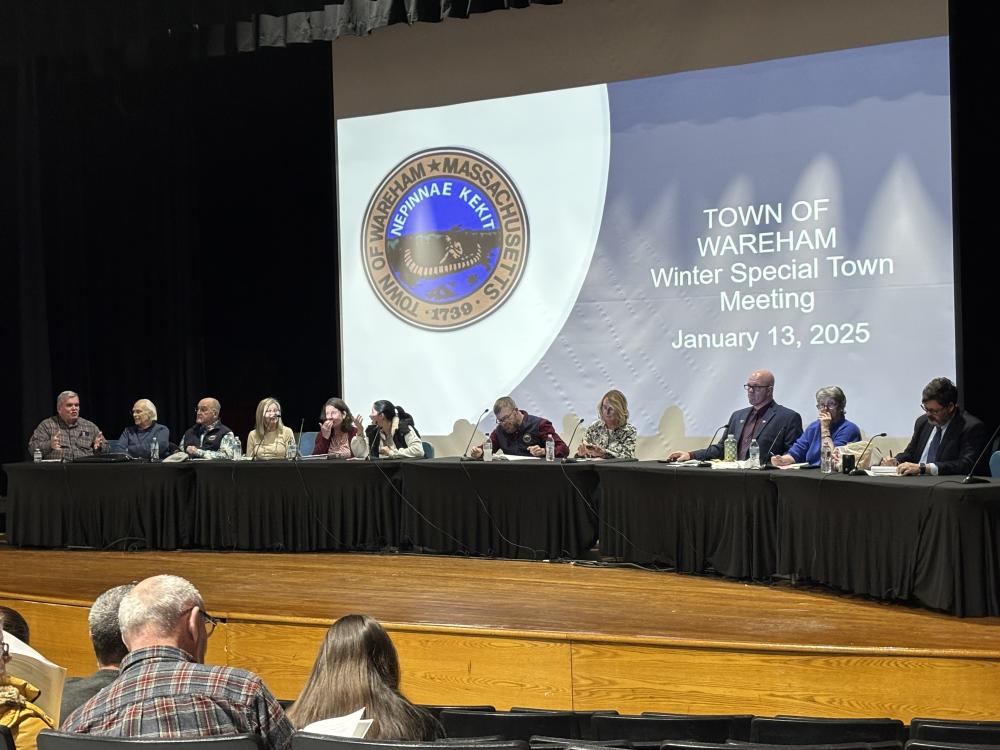Special Town Meeting voters decide proposed housing, solar changes need more study
At the Jan. 13 Special Town Meeting, voters decided that proposed zoning changes affecting future solar and housing development needed more study.
Voters heard two proposals that would change zoning bylaws in Wareham. One created a designated district for future large-scale solar installations. The other proposal outlined the additional regulations the town would apply to a recent statewide zoning law change. The change allowed properties zoned for single-family homes to add a second, smaller residence, known as an accessory dwelling unit.
Voters passed a motion for further study on both proposals, delaying a decision on the matters until more information can be gathered.
Although voters did not approve the additional regulations the town proposed for accessory dwelling unit construction, they did vote in favor of a moratorium on the state law. As a result, small additional homes on single-family properties will not be allowed in Wareham until Jan. 13, 2026, pending the attorney general’s approval of the decision.
Town officials said they could not predict if the attorney general will agree with the Wareham voter’s decision.
The other zoning change voters said needed more study proposed confining all future large-scale ground mounted solar development to a designated area.
The area for the “solar zoning district” is the existing business overlay district, which covers about 1,300 acres north of Interstate 495.
The proposal did not make any changes to the existing permitting requirements for building large solar arrays and did not apply to any “at will” solar construction, such as those on the roofs of homes or businesses.
Voters raised concerns over the safety of batteries used for solar energy storage and the location of the district. Additionally, many voiced their displeasure with common practices associated with large solar development, such as clear cutting forests.
Some said they felt the district would encourage more large-scale solar development which town officials emphasized was incorrect.
“We are responding to the pressure we get from the Massachusetts legislature,” said Planning Board Chair Carl Schulz. "We are trying to protect the rest of the town."
Land Use Coordinator Josh Faherty said that creating the district would not loosen any existing permitting restrictions.
The Affordable Homes Act, which goes into effect in February, changed zoning laws statewide to allow the construction of accessory dwelling units.
Municipalities have the ability to write their own additional zoning bylaws for accessory dwelling units, such as design requirements. Voters heard the town’s proposed bylaws on Monday night.
Many voiced confusion over passing both a moratorium on the state law and Wareham’s own additional regulations on it.
Town officials explained that the bylaw was written in case the moratorium is denied by the attorney general. In that scenario, the town would have localized regulations on the books.
“That’s why we have them both on there, it's kind of a belt and suspenders but you know what happens when you don’t have a belt or suspenders,” said Town Counsel Richard Bowen.
Voters raised concerns with some of the specifics in the bylaws, with many concluding that it needed more work. The discussion ended with voters passing a motion for further study on the proposed regulations.
Voters will address the creation of a solar zoning district and the town’s implementation of the Affordable Homes Act again at the Spring Town Meeting.















